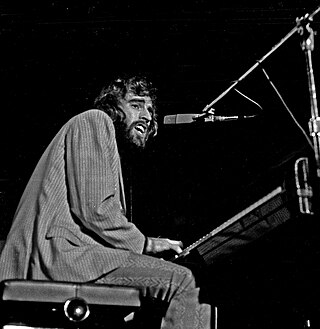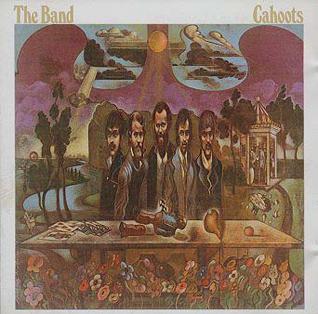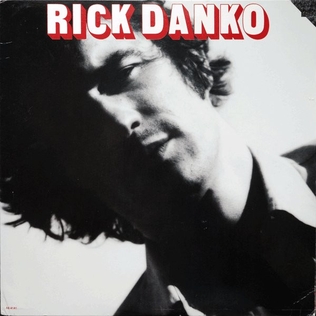Related Research Articles

The Band was a Canadian-American rock band formed in Toronto, Ontario, in 1957. It consisted of Canadians Rick Danko, Garth Hudson, Richard Manuel, Robbie Robertson, and American Levon Helm. The Band's music combined elements of Americana, folk, rock, jazz and country, which influenced artists such as George Harrison, Elton John, the Grateful Dead, Eric Clapton, and Wilco.

Music from Big Pink is the debut studio album by Canadian-American rock band the Band. Released on July 1, 1968, by Capitol Records, it employs a distinctive blend of country, rock, folk, classical, R&B, blues, and soul. The album's title refers to a house in West Saugerties, New York called "Big Pink", which was shared by bassist/singer Rick Danko, pianist/singer Richard Manuel and organist Garth Hudson and in which the album's music was partly composed. The album itself was recorded in studios in New York and Los Angeles in 1968, and followed the band's stint backing of Bob Dylan on his 1966 tour and time spent together in upstate New York recording material that was officially released in 1975 as The Basement Tapes, also with Dylan. The cover artwork is a painting by Dylan.

Richard Clare Danko was a Canadian musician, bassist, songwriter, and singer, best known as a founding member of the Band, for which he was inducted into the Rock and Roll Hall of Fame in 1994.

Richard George Manuel was a Canadian musician, singer, and songwriter, best known as a pianist and one of three lead singers in the Band, for which he was posthumously inducted into the Rock and Roll Hall of Fame in 1994.

Leonard Harold Breau was an American-Canadian guitarist. He blended many styles of music, including jazz, country, classical, and flamenco. Inspired by country guitarists like Chet Atkins, Breau used fingerstyle techniques not often used in jazz guitar. By using a seven-string guitar and approaching the guitar like a piano, he opened up possibilities for the instrument.

Eric "Garth" Hudson is a Canadian multi-instrumentalist best known as the keyboardist and occasional saxophonist for rock group the Band, for which he was inducted into the Rock and Roll Hall of Fame in 1994. He was a principal architect of the group's sound, described as "the most brilliant organist in the rock world" by Keyboard magazine. As of 2023, with the death of Robbie Robertson, Hudson is the last living original member of the Band.

Cahoots is the fourth studio album by Canadian-American rock band the Band. It was released on September 15, 1971 to mixed reviews, and was their last album of original material for four years. The album's front cover was painted by New York artist/illustrator Gilbert Stone, while the back cover features a photograph portrait of the group by Richard Avedon. The album features guest vocals from Van Morrison. Libby Titus, the partner of drummer Levon Helm and mother of their daughter Amy Helm, also contributed uncredited backing vocals to "The River Hymn", the first time a woman appeared on a Band album.

Northern Lights – Southern Cross is the sixth studio album by Canadian-American rock band the Band, released in November 1975. It was the first album to be recorded at their new California studio, Shangri-La, and the first album of all new material since 1971's Cahoots. It was recorded using a 24-track tape recorder, which allowed Garth Hudson to include multiple layers of keyboards on several tracks, and it is the only Band album where all songs are credited as compositions of guitarist Robbie Robertson.

Jericho is the eighth studio album by Canadian-American rock group the Band. Coming seventeen years after their "farewell concert", it was released in 1993 and was the first album to feature the latter-day configuration of the group, as well as their first release for the Rhino subsidiary Pyramid Records.

Jubilation is the tenth and final studio album by Canadian/American rock group the Band. Recorded in the spring of 1998 in Levon Helm's home studio in Woodstock, New York, it was released on September 15, 1998. For the first time since the group reformed without guitarist and songwriter Robbie Robertson, there were more originals than covers. Songs include "Last Train to Memphis", featuring guest guitarist Eric Clapton, Garth Hudson's solo instrumental closer "French Girls", Rick Danko's "High Cotton" and the ode to Ronnie Hawkins, "White Cadillac".

Rick Danko is the 1977 eponymous debut by the bassist and singer for the Band. Featuring ten tracks mainly written by Danko, mostly in conjunction with lyricists Bobby Charles and Emmett Grogan, it was the first solo album by any member of the group and was Danko's only solo studio album; the other two albums he released in his lifetime were solo live recordings and collaborative studio albums.
John Simon is an American music producer, composer, writer and performer. Recognized as one of the top record producers in the United States during the late 1960s and the 1970s, some of Simon's most well known work includes the Band’s Music from Big Pink, The Band, and The Last Waltz, Cheap Thrills by Big Brother & the Holding Company featuring Janis Joplin, Songs of Leonard Cohen by Leonard Cohen, and Child Is Father to the Man by Blood, Sweat & Tears.
Kevin Doherty is an Irish songwriter, musician and singer. He has played with various bands since the late 1980s and currently records and performs both as a solo artist and as a member of Four Men and a Dog.
The Cate Brothers is an American band led by the songwriter-musician duo of twin brothers Earl and Ernest "Ernie" Cate, from Fayetteville, Arkansas. In the mid-1960s, they became performers of country soul music at clubs and dances in Arkansas and elsewhere in the mid-South of the United States. Both brothers are singers, with Earl playing guitar and Ernie playing piano. The group began recording in 1970, releasing their final album in 2006.
"Look Out Cleveland" is the title of the Robbie Robertson-written song on The Band's self-titled album, also known as The Brown Album. The song begins with a boogie-woogie blues riff by pianist Richard Manuel followed by lead singer Rick Danko warning -- "Look out Cleveland, storm is coming through, And it’s runnin’ right up on you". The song's reference is presumably to Cleveland, Ohio, but Cleveland, Texas has also been suggested.
Stanley Martin Szelest was an American musician from Buffalo, New York, known for founding an influential blues band in the 1950s and 1960s, Stan and the Ravens, and later as a keyboardist with Ronnie Hawkins and, briefly, with The Band.
Bearfoot was a Juno Award-nominated Canadian rock band, founded by Jim Atkinson, Terry Danko, Dwayne Ford, Hugh Brockie and Brian Hilton. Initially going by "Atkinson, Danko and Ford", they changed their name out of practicality and because they didn't want to sound as though they were a law-firm. They released three albums and five singles through Columbia Records.

Let It Rock is a Juno Award-nominated album that documents American-Canadian singer Ronnie Hawkins's 60th birthday celebration and concert at Massey Hall in Toronto, Ontario. The concert took place on January 8, 1995, and featured performances by Hawkins, Carl Perkins, Jerry Lee Lewis, the Band and Larry Gowan. Jeff Healey sat in on guitar for most, if not all, of the performances. Hawkins's band, the Hawks, or permutations of it, backed most, if not all, of the acts. All of the musicians performing that night were collectively dubbed "the Rock ‘N’ Roll Orchestra". The concert is among the last recorded of both Perkins and Rick Danko of the Band. An eponymous video of the concert was also released.

Terje Lillegård Jensen, commonly known by his stage name Jonas Fjeld, is a Norwegian singer, songwriter, and guitarist. He is best known in the English-speaking world for two albums recorded by Danko/Fjeld/Andersen, a collaboration with Canadian Rick Danko of The Band and American singer-songwriter Eric Andersen. Fjeld also recorded three albums with the American bluegrass group Chatham County Line.
"We Can Talk" is a 1968 song by The Band that was the opener for the second side of their debut album Music From Big Pink Written by Richard Manuel, it features The Band's three main vocalists in nearly equal turns, often finishing each other's phrases. Initially a staple of their concerts, it was dropped from the set list in 1971.
References
- Danko, Terry [usurped] . Canadian Pop Encyclopedia. Great White Noise. Retrieved 2010-12-31.
- Caffin, Carol. "Terry Danko – Authorized Biography". theband.hiof.no. Retrieved 2010-12-31.
- Terry Danko – Credits. allmusic.com. Retrieved 2010-12-31.
- http://sipthewine.blogspot.com/2009/01/terry-dankos-lost-tapes-new-interview.html
- http://theband.hiof.no/articles/TerryDankoBandBite1vol2.html